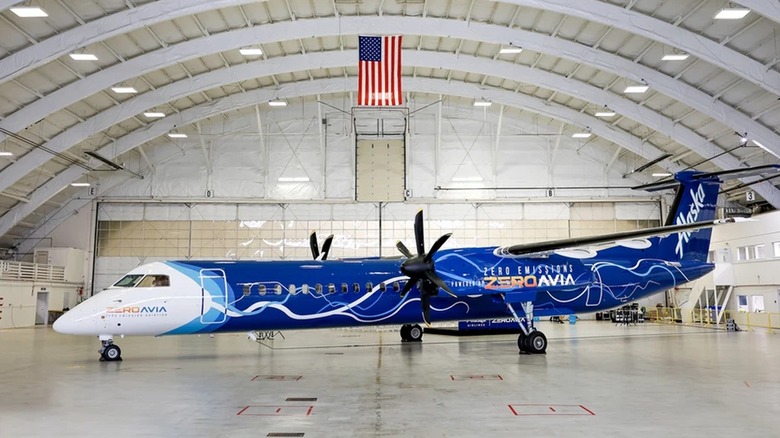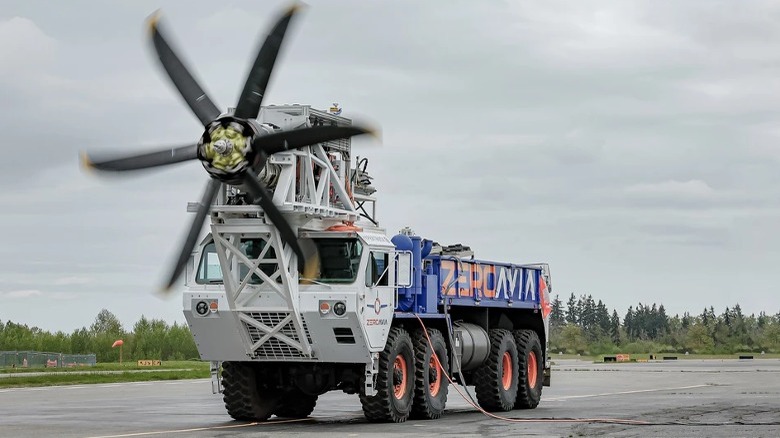Here's How Hydrogen Powered Turboprop Engines Could Change The Way You Travel
Alaska Airlines is the most recent player to enter the field of hydrogen-powered flight. In May, Alaska Airlines announced a partnership with ZeroAvia aimed at ultimately revolutionizing regional air traffic networks with hydrogen-fueled aircraft. While the proposed zero-emissions vessel remains conceptual at this stage, the viability of hydrogen-fueled flight could potentially upend the air travel paradigm.
In March 2023, an aircraft powered by Universal Hydrogen's fuel cell design made history with the largest vessel to cruise primarily by hydrogen fuel. Similarly, Airbus is aiming to roll out commercial aircraft powered by hydrogen fuels cells by 2035. The company launched the ZEROe demonstrator in 2022 in an effort to deliver a viable hydrogen-propelled engine platform by 2025.
Alaska Airlines' project is set to bring the largest zero-emission aircraft to date into the fold. In coordination with its partner on this breakthrough technology, the duo is developing a propulsion system — ZeroAvia's HyperCore — that will stand as a major stepping stone toward zero emission air travel across the industry.
"Alaska Airlines has defined a five-part journey to achieve net zero carbon emissions long-term, but we can't get there alone," said Ben Minicucci, the CEO of Alaska Airlines. "New technologies are required to make that future possible."
ZeroAvia's contribution to the vision is substantial, with its own record for the world's largest aircraft to fly under the power of a zero emission power source back in 2020.
Hydrogen propulsion offers efficiency and other improvements
The new propulsion system on this Bombardier Q400 is underpinned by a new fuel cell installation that's roughly five times more powerful than anything yet demonstrated in an aircraft. ZeroAvia has already conducted extensive ground testing of the 1.8 MW HyperCore system, combined with the gearbox and propeller that are standard among Q400 (also known as Dash 8-400) aircraft.
Not only is hydrogen fuel an amazing means of curbing aircraft pollution, many of the electric propulsion systems that power those planes run with little noise. This wouldn't just affect the atmosphere, as a result, but would revitalize communities that have long suffered the effects of noise pollution beneath and around airports around the world. Studies suggest that noise pollution from airports is a major stress inducer, but it can also create an increased risk of cardiovascular disease among residents living in the vicinity.
Hydrogen fuel cells could play a major role in eliminating harmful emissions
Because the hydrogen-propelled electric engines in these designs reduces carbon emissions, a refit of numerous aircraft with this type of propulsion system would go a long way to slashing harmful emissions that are currently devastating the atmosphere. Existing test systems have so far been focused primarily on smaller aircraft, but even if manufacturers transitioned small cargo and regional airline vessels to this new fuel system, the results would be impactful.
It's estimated that a third of all aviation emissions come from flights less than 932 miles (1,500 kilometers), placing short haul flights of all types at the forefront for efforts to reduce carbon output. Large commercial aircraft would certainly become a target for overhaul in the future, but a prioritization of small aircraft could offer a massive improvement in air travel's environmental impact.
By shifting to hydrogen fuel cells on aircraft participating in regional flight routes, airlines would take an enormous step in the right direction when it comes to making a difference in the battle against climate change. Similarly, companies like Amazon and UPS operate complex networks of air cargo routes that could benefit immensely from a switch to these new propulsion systems. Even if large scale commercial travel converting to hydrogen remains far off in the future, hydrogen fuel cells will almost certainly change air travel for the better.


